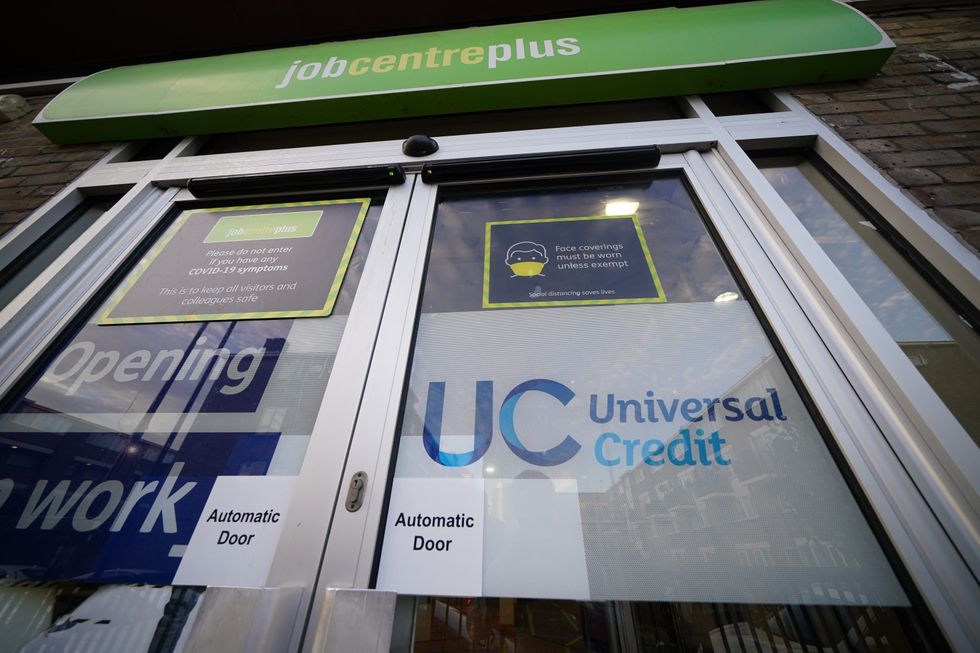Universal Credit claimants lose parts of their payment entitlement depending on how much they have saved
Don't Miss
Most Read
Trending on GB News
Universal Credit capital rules are undermining Government policies aimed at encouraging lower-income households to save, according to a damning new report from the Resolution Foundation.
The "Saving penalties" report, published today, reveals that long-neglected rules governing capital means-testing in Universal Credit are creating barriers for families trying to build financial resilience.
Current thresholds, frozen since 2006, reduce benefit entitlement for claimants with savings above £6,000 and eliminate benefits entirely for those with over £16,000.
The report estimates that around two million families who would have been eligible for Universal Credit based on income had their entitlement reduced due to these capital rules in 2020-22.

Lower income households are losing out due to the "penalising" savings rules linked to Universal Credit
GETTY
Of these, 830,000 families faced partial reductions, while 1.2 million families lost entitlement completely. The average household income of affected families was just £15,700, highlighting the impact on lower-income households.
Nearly half of affected families (47 per cent) had relatively modest capital of £16,000 or less, while 16 per cent held over £100,000.
Most of this capital was held in easily accessible accounts, with more than 80 per cent kept in current accounts, savings accounts, ISAs, or National Savings and Investment products for families with capital of £50,000 or less.
The report highlights three key problems created by these capital rules. Firstly, they undermine flagship Government saving schemes like Help to Save and Lifetime ISAs, which are designed to boost financial resilience for UC recipients.
Do you have a money story you’d like to share? Get in touch by emailing money@gbnews.uk.
 Savers can get a 50 per cent boost via the the Help to Save scheme GETTY
Savers can get a 50 per cent boost via the the Help to Save scheme GETTY When savings from these schemes remain within scope of capital rules, it weakens their impact and effectively penalises families trying to build meaningful savings. Secondly, the near 20-year freeze in thresholds means more families are affected than ever before.
In 2006-08, only 35 per cent of UK families had savings above £6,000, but by 2020-22 this had risen to nearly half (45 per cent). Had the thresholds risen with inflation, they would now be over £10,000 and £27,000, respectively.
Thirdly, the rules create the kind of cliff-edges that Universal Credit was originally designed to eliminate. For example, a family entitled to £750 monthly in UC based on income alone would see this reduced to £576 with £16,000 in savings, but would receive nothing if they saved just one penny more.
The capital rules are actively discouraging saving among Universal Credit recipients. Nearly one-in-eight (12 per cent) UC recipients who can afford to save refrain from doing so to retain their benefit entitlement.
In the two years leading up to March 2023, seven per cent of all UC recipients reported avoiding saving due to the risk of losing benefits. The report identifies several straightforward policy changes to improve the system.
Firstly, money saved through Help to Save and Lifetime ISAs should be exempted from the capital rules. This would empower low-to-middle-income families to build meaningful financial resilience and achieve long-term goals like home ownership.
Secondly, uprating the current capital limits with inflation from 2026-27 onwards would prevent the system from becoming increasingly punitive. This change would cost approximately £135million by 2029-30.
Finally, removing the £16,000 cliff edge should be considered as part of the upcoming review of Universal Credit. While not an immediate priority, this reform would eliminate cliff edges, poverty traps, and perverse incentives at an estimated cost of £900million by 2029-30.
LATEST DEVELOPMENTS:

Think tanks are calling for a rethink of the existing Universal Credit rules
PAWith the Government currently reviewing Universal Credit, the Resolution Foundation suggests this is an opportune time to implement reforms encouraging low-income families to save.
Molly Broome, senior economist at the Resolution Foundation, said: "Benefits are means-tested on both income and capital. But the long-term neglect of the capital rules in Universal Credit means they are now undermining wider Government efforts to encourage low-income families to save."
"Important schemes such as Help to Save and Lifetime ISAs should be exempted from these capital rules so that families doing the right thing by saving into them aren't penalised for doing so."
"And with the Government currently reviewing Universal Credit, it should take the opportunity to index the capital thresholds to inflation, to prevent the system from penalising more families every year. Fortunately, this can be done at limited cost to the Exchequer."









